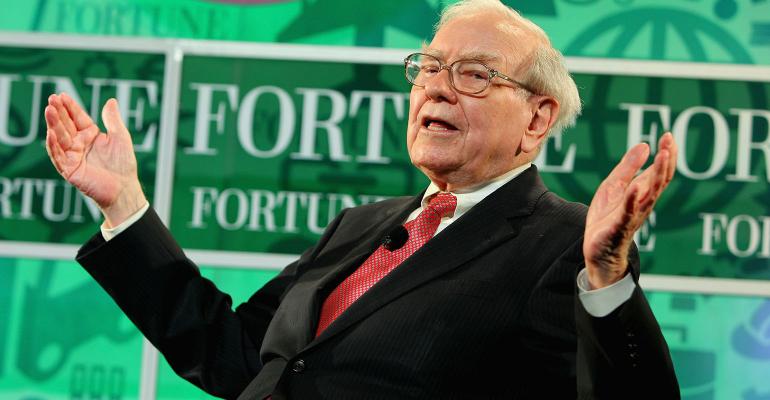(Bloomberg) -- Warren Buffett created Berkshire Hathaway Inc.’s Class B shares almost 30 years ago to stymie money managers who sought to split the high-priced conglomerate’s stock.
One of South Korea’s largest retail brokerages now plans to package the Class B shares into an exchange-traded fund turbocharged with derivatives, another move that Buffett might not like.
Kiwoom Securities Co. teamed up with Milwaukee-based Tidal Investments to form an ETF designed to provide 200% the daily performance of Berkshire, according to a regulatory filing.
Single-stock ETFs such as this have been sweeping the fund world, using leverage that amps up the potential returns — and losses — of high-flyers such as Nvidia Corp. and Tesla Inc. In South Korea, brokerages such as Toss Securities and Mirae Asset Securities Co. have been seeking to capitalize on rising demand for US stocks amid sluggish performance by domestic equities.
“Traditionally on the leveraged ETFs, the lion’s share of the interest and asset flow has been on the more volatile names,” Gavin Filmore, chief revenue officer for Tidal, said in an interview. “Berkshire is almost the polar opposite.”
Leveraged ETFs are often meant for active traders who want to bet on a stock’s performance for no more than a single day, as these funds typically veer off course when tracking shares over a longer period. The use of derivatives to juice Berkshire returns might not sit well with Buffett, who once called them “financial weapons of mass destruction.”
While Buffett’s firm is a well-known name, it remains to be seen whether day traders will have an appetite to ride a steady stock such as this one with this type of leveraged strategy. Buffett is known as the ultimate long-term investor who advises people to own stocks they’d be comfortable holding for years.
Buffett, 94, and his firm already have a following in South Korea. As of Nov. 8, individual investors in South Korea owned more than $800 million worth of Berkshire Class A and Class B shares, according to data compiled by the Korea Securities Depository.
Asian markets “have a penchant for Berkshire,” said Matthew Palazola, an insurance analyst at Bloomberg Intelligence.
The ETF listing is not finalized yet and Kiwoom is waiting for the approval by Korea’s Financial Supervisory Service, the country’s financial watchdog, Kiwoom said in response to a Bloomberg query. Representatives for Berkshire didn’t reply to a message seeking comment.
Retail investors in South Korea have embraced some of the largest leveraged ETFs listed in the US. The Direxion Daily TSLA Bull 2X Shares, a single-stock ETF for Tesla stock, has taken in $225 million so far this year from South Korean retail investors, raising their total stake in the ETF to $1.2 billion as of Nov. 8, according to depository data.
While Kick BRK 2X Long Daily Target, as it’s known, would be the first Berkshire single-stock ETF in the US, several others trade abroad. Still, they’ve failed to gain much of a following: Leverage Shares 2x Long Berkshire Hathaway ETP Securities, which trades on several European exchanges, only has about $2.3 million of assets.
Read More: Korea’s Retail-Trading Army Is Going All-In on US Leveraged ETFs
Kiwoom’s new ETF would buy Berkshire Class B shares and then issue its own stock to investors, potentially at a much lower price than the $467.36 that each Class B share sold for as of market close on Monday. To amplify its exposure to Berkshire’s daily returns, the ETF will enter into swaps with broker dealers and also trade listed options on the Omaha, Nebraska company’s B shares.
The Berkshire ETF would be a Kiwoom product that Tidal runs behind the scenes in exchange for a portion of management fees.
‘Stained Reputation’
Wall Street’s efforts to create an early version of a single-stock fund for Berkshire shares spurred Buffett to create the company’s Class B shares almost three decades ago. At the time, Berkshire had only one class of stock that traded for more than $30,000 a share, and ETFs were in their infancy.
In 1995, Philadelphia politician Sam Katz filed papers to create a unit investment trust, a fund-like vehicle that buys a fixed portfolio of stocks and bonds up front and then holds the securities for a set period. He wrote that the trust would provide “convenient and affordable access to the common stock of Berkshire Hathaway without the requirement to own full shares.”
Berkshire threatened to put the trust out of business by doing a stock split, setting up its own trust or creating a second share class, Katz said in an interview.
Buffett made good on that last threat by issuing Class B shares equal to 1/30th of a Class A share. Investors flocked to the new stock, rendering trusts such as Katz’s obsolete.
In a 1996 letter to shareholders, Buffett warned that such trusts were “expense laden” vehicles that brokers would market “en masse to unsophisticated buyers” in order to earn big commissions. That would have burdened Berkshire “with both hundreds of thousands of unhappy, indirect owners (trustholders, that is) and a stained reputation.”
Katz said he doesn’t have any regrets: “How many guys do you know who get to do battle with Warren Buffett?”





